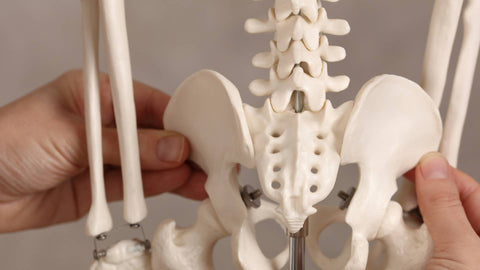Waking up with a stiff neck after sleeping on a new pillow can be frustrating. A new pillow can indeed cause neck pain, especially during the initial adjustment period. This discomfort often stems from the pillow's firmness, height, or material not aligning properly with your sleeping position and body shape.
Your neck needs proper support to maintain its natural curve while you sleep. A pillow that's too high or too low can strain your neck muscles and lead to pain. Additionally, some pillows, particularly memory foam ones, may take time to "break in" and conform to your body. During this period, which can last 30 to 60 days, you might experience some neck discomfort.
Don't give up on your new pillow just yet. It's important to allow time for your body to adjust and for the pillow to soften. If neck pain persists beyond a few weeks, you may need to reassess your pillow choice. Consider factors like your preferred sleeping position, any existing neck issues, and the pillow's material to find the best option for your comfort and sleep quality.
Understanding the Relationship Between Pillows and Neck Pain
Pillows play a crucial role in maintaining proper neck alignment and comfort during sleep. The right pillow can prevent neck pain, while an unsuitable one may lead to discomfort and stiffness.
The Impact of Pillow Material on Neck Health
Memory foam pillows mold to your head and neck, providing personalized support. They distribute pressure evenly, reducing strain on your neck muscles. Latex pillows offer similar benefits but tend to be more durable and cooler.
Foam pillows often need a break-in period of 30-60 days before reaching optimal comfort. During this time, you might experience temporary neck discomfort as the pillow adjusts to your body shape.
Traditional feather pillows, while soft, can cause neck pain due to inadequate support. They tend to flatten quickly, failing to maintain proper neck alignment throughout the night.
How Pillow Firmness Affects Spinal Alignment
Pillow firmness directly impacts your spinal alignment. A pillow that's too soft can cause your head to sink, straining your neck muscles. Conversely, an overly firm pillow may elevate your head excessively, creating an unnatural curve in your spine.
The ideal firmness varies based on your sleeping position and personal preference. Side sleepers typically need firmer pillows to fill the gap between their head and shoulders. Back sleepers often benefit from medium-firm pillows that support the natural curve of the neck.
Stomach sleepers may find relief with softer, thinner pillows to minimize neck rotation. Adjustable pillows allow you to customize firmness for optimal support.
The Role of Sleep Position in Neck Support
Your sleeping position significantly influences the type of pillow support you need. Back sleepers benefit from pillows with a slight contour to cradle the neck's natural curve. This position helps maintain neutral spine alignment.
Side sleepers require thicker pillows to keep their head level with their spine. Look for pillows that fill the space between your ear and outer shoulder to prevent neck strain.
Stomach sleeping often leads to neck pain due to head rotation. If you can't change positions, use a very thin pillow or no pillow at all to minimize neck twisting. Placing a pillow under your hips can help reduce lower back strain in this position.
Choosing the Right Pillow for Optimal Neck Health
Selecting the ideal pillow can significantly impact your neck health and sleep quality. The right choice depends on your sleep position, personal preferences, and specific neck support needs.
The Search for the Best Pillow for Neck Pain
When looking for a pillow to alleviate neck pain, consider your sleep position. Side sleepers often benefit from firmer, higher pillows that keep the spine aligned. Back sleepers may prefer medium-firm pillows that support the natural curve of the neck.
Memory foam pillows can offer excellent neck support by molding to your shape. Latex pillows provide a balance of support and comfort, with natural cooling properties. Contour or cervical pillows are designed specifically for neck support.
Avoid feather or down pillows if you have neck pain, as they tend to lose shape easily and provide inconsistent support.
Considering Pillow Types and Their Benefits
Memory foam pillows offer consistent support and pressure relief. They're excellent for maintaining proper neck alignment throughout the night. Latex pillows are naturally hypoallergenic and provide a responsive, bouncy feel that many find comfortable.
Polyester pillows are affordable and easy to care for, but may not offer the best neck support. Ergonomic latex pillows combine the benefits of latex with a shape designed for optimal neck positioning.
When choosing a pillow, consider:
- Fill material
- Firmness level
- Your preferred sleep position
- Cooling properties
- Allergies or sensitivities
Remember, finding the right pillow often involves trial and error. Many providers offer sleep trials, allowing you to test a pillow before committing.
Secondary Factors Influencing Neck Pain and Pillow Choice
Neck pain isn't solely about pillow selection. Your mattress, sleeping habits, and daily posture all play crucial roles in determining your neck comfort.
Impact of Mattress Firmness and Sleeping Habit
Your mattress firmness directly affects spinal alignment and neck support. A too-soft mattress can cause your body to sink, misaligning your neck. Conversely, an overly firm mattress may create pressure points.
Sleeping positions also influence neck strain. Back sleeping generally maintains neutral spine alignment. Side sleeping requires a thicker pillow to fill the shoulder-neck gap. Stomach sleeping often twists the neck, potentially causing pain.
Consider these factors:
- Mattress age and condition
- Your preferred sleeping position
- Body weight and shape
Experiment with different mattress toppers or pillows to find your ideal combination for neck support and comfort.
Understanding Posture and Ergonomics Beyond the Bedroom
Your daytime posture significantly impacts nighttime neck comfort. Poor sitting or standing habits can lead to muscle tension and stiffness that persist during sleep.
Key ergonomic considerations:
- Maintain a neutral spine when sitting
- Position computer screens at eye level
- Take regular breaks to stretch and move
Neck exercises can help. Try gentle neck rotations and shoulder rolls throughout the day. This can reduce muscle tension and improve overall neck flexibility.
Be mindful of your phone use. "Text neck" from prolonged downward head tilt can strain neck muscles. Hold your phone at eye level when possible.
Remember, good posture isn't just about your neck. It involves your entire spine, from lower back to head. Addressing full-body alignment can have positive effects on neck comfort.
Health and Maintenance of Sleeping Accessories
Proper care of your pillows and other sleep accessories is crucial for maintaining comfort and preventing neck pain. Regular cleaning and timely replacement can significantly impact your sleep quality and overall health.
The Importance of Cleanliness and Allergens in Pillow Health
Dust mites thrive in pillows, potentially causing allergic reactions and discomfort. Wash your pillows every 3-6 months in hot water to eliminate these microscopic pests. Use pillow protectors to create an additional barrier against allergens and extend the life of your pillow.
For down and polyester pillows, machine washing is usually safe. Buckwheat pillows require special care - empty the hulls and wash only the cover. Always check the care label for specific instructions.
Vacuum your pillows weekly to remove surface dust and debris. This simple habit can greatly reduce allergen buildup and improve your sleep environment.
When to Replace Your Pillow for Maximum Benefit
Replace your pillow every 1-2 years to ensure optimal support and cushioning. Signs it's time for a new pillow include:
- Lumps or flat spots
- Persistent odors
- Yellowing or stains
- Waking up with neck pain or stiffness
Different materials have varying lifespans. Memory foam pillows typically last 2-3 years, while down pillows may last up to 5 years with proper care.
When choosing a new pillow, consider your sleep position and any chronic neck pain issues. A pillow that maintains proper spinal alignment can significantly improve sleep quality and reduce discomfort.



